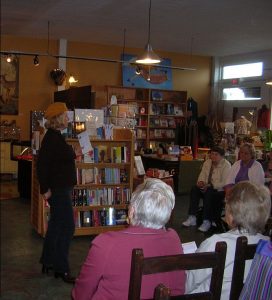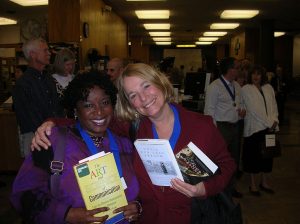 Another ball hits the frame of my tennis racquet and careens off into a corner on my side of the court.
Another ball hits the frame of my tennis racquet and careens off into a corner on my side of the court.
“Are you okay over there?” my opponent calls out.
 Another ball hits the frame of my tennis racquet and careens off into a corner on my side of the court.
Another ball hits the frame of my tennis racquet and careens off into a corner on my side of the court.
“Are you okay over there?” my opponent calls out.
I’m a writer, so I love words. I couldn’t help but notice, when I spoke on a panel at theWest Hollywood Book Fair last fall, that almost all the advice I had for the audience could be summarized in words that started with the letter “S.”
I worked with this a little more to come up with the theme for a speech I gave on Presidents Day Weekend at the Southern California Writers Conference. I called the talk “My Years of Writing CopiouSSSSSSly: How I Wrote 20.5 Books in 10 Years and Remained Relatively Normal (I Think),” and here are some of the things I said about what writers need to have, be, or do to keep producing.
Sitzfleisch—A Yiddish term for—well, you figure it out. It’s the ability to stay put in your chair for long periods of time without jumping up to see what’s in the fridge, or who’s sent you e-mail.
Structure—A calendar with specific goals and deadlines (self-imposed are fine), and a work schedule (including quitting time) are really essential to keep from working too much. That’s a bigger problem for me than working too little, but I think it would work equally well in the opposite situation.
Stamina —Staying fit is crucial. I do tend to slack off on this when I’m in the middle of writing a book, but I try not to regress too much, since it affects my overall health, and that governs everything else.
Sanitation—Get out of the jammies and into the shower. Wash your hair, brush your teeth, and don’t forget to floss. Serioussssly!
Stretch–I have a small deck off my study, and amazingly, even going outside for a minute or two to think through a phrasing or a plot detail can have amazing results.
Side interests—Sudoku? Step class? Shopping? Calling on different parts of your body and brain is restorative.
Sunscreen—Take time out, even if it’s just for an hour or two. Find a pool to jump in or a patch of grass to sit on. Think “vacuoussssss.” Try not to think about what you’re writing, but even if you do, it will still feel like a change of pace.
Skin—As in “Superthick.” Learn to laugh at your reviews. Reading them aloud in a whiny voice helps.
Self-Confidence—writing well is never easy, but you can do it. Remember, it’s just a draft until it’s published.
Spellbound—This is something you have to be. You have to find your subject enthralling. Your curiosity needs to be boundlesssss.
Seniority—Writing is one of those things where it helps to have some years under your belt. Tell yourself that all that wisdom is why you need a larger belt.
Say “When”—at some point you have to say “I’m finished with this.” When you’re agonizing over commas, that’s a good clue.
Supporters, Sidekicks, Soulmates—Self-explanatory! If you’re lucky, you have a supportive family and friends, like I do. Another source of support is a writing group. I don’t participate in these because I get too wrapped up in my own work to pay quality attention to anyone else’s (I have difficulty reading even published books when I am actively writing), but many people find sharing works in progress essential to their productivity.
I asked people in the audience if they had any other “S” words of advice, and I got three good ones:
Sleep–I can’t believe I didn’t think of this. Maybe it’s because a good night’s sleep is rare when I’m in the middle of a book, although I do find that very often I wake up ready to rip with a new idea I must have been processing during the night.
Sucks!–Give yourself permission to write badly when that’s the best you can do. Or jump forward and write something that isn’t going to happen for another twenty pages or so, and go back and fill in the rest later
Speak–though I tend not to talk about what I’m writing until I’ve finished the first draft, one person in the audience said that it helps him to tell his story out loud, since it often gives him insight into what to do next or how to make it better. He told me afterwards he used to do this on long car commutes with his friends, but eventually he found himself driving alone, so he changed his ways!
Fellow writers out there in the blogosphere–got more?

Sometimes a photo says it all. Here I am with my good friend Pamela Shekinah Perkins, who was writing her own book around the time I was debating whether to write UNTIL OUR LAST BREATH. Both our books came out roughly the same time, hers from Wiley  and Sons, entitled THE ART AND SCIENCE OF COMMUNICATION. She’s the one I acknowledged in the back of UNTIL OUR LAST BREATH as having “cajoled and challenged” me to take the leap as a writer that UNTIL OUR LAST BREATH required. She’s also the founder of the Human Communication Institute (www.hci-global.net) Think we’re glad to be friends? I am so proud of her.
and Sons, entitled THE ART AND SCIENCE OF COMMUNICATION. She’s the one I acknowledged in the back of UNTIL OUR LAST BREATH as having “cajoled and challenged” me to take the leap as a writer that UNTIL OUR LAST BREATH required. She’s also the founder of the Human Communication Institute (www.hci-global.net) Think we’re glad to be friends? I am so proud of her.